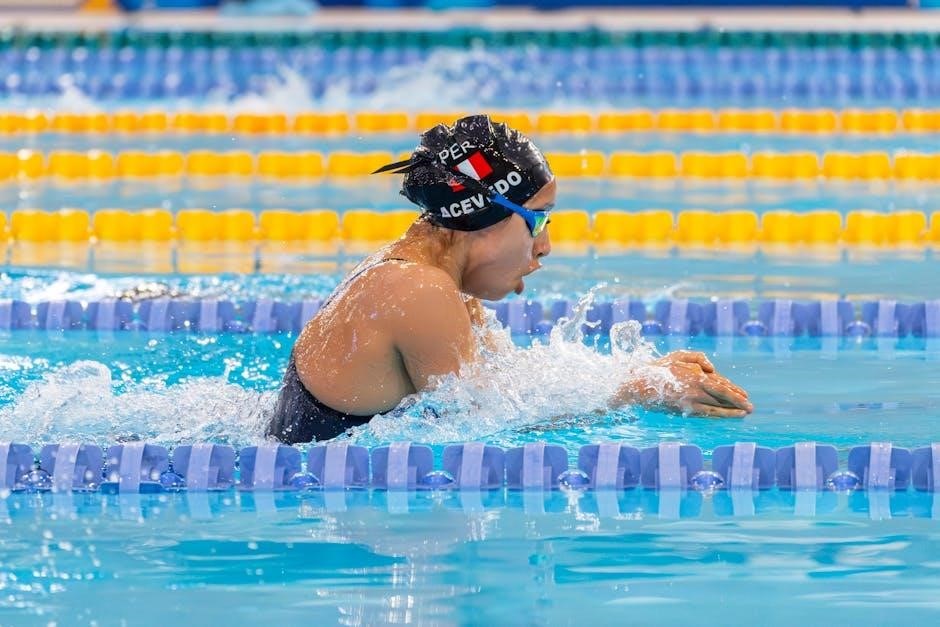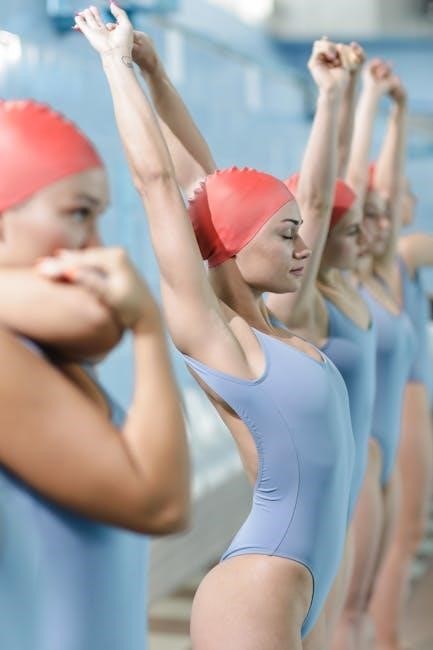To get results and up performance, competitive swimmers need a diet plan, eating smart is essential for optimal results, with a focus on nutrition and meal planning, using a competitive swimmers diet plan pdf guide.
Importance of Nutrition for Swimmers
Nutrition plays a vital role in the performance of competitive swimmers, as it provides the necessary energy and nutrients for optimal physical function. A well-planned diet can help swimmers achieve their goals, whether it’s to improve their technique, increase their endurance, or enhance their overall performance. According to various studies, a balanced diet that includes a variety of foods from all food groups is essential for swimmers. The importance of nutrition for swimmers cannot be overstated, as it has a direct impact on their ability to train, recover, and compete at their best. By fueling their bodies with the right foods, swimmers can optimize their physical performance, reduce their risk of injury and illness, and achieve their full potential in the water. Proper nutrition is essential for swimmers to perform at their best, and a competitive swimmers diet plan pdf can provide guidance on how to achieve this.

Energy Needs for Competitive Swimmers
Competitive swimmers require high energy intake, typically ranging from 6000 to 10000 calories per day, depending on training intensity and duration, using a competitive swimmers diet plan pdf for guidance always.
Caloric Intake for Swimmers
Caloric intake is a crucial aspect of a competitive swimmers diet plan pdf, as it directly impacts their energy levels and performance. The daily caloric needs of swimmers vary depending on factors such as age, sex, weight, and training intensity. Generally, competitive swimmers require a high caloric intake to support their energy expenditure, with estimates ranging from 6000 to 10000 calories per day. This is significantly higher than the average adult’s daily caloric needs, highlighting the importance of proper nutrition for swimmers. A well-structured diet plan pdf can help swimmers meet their caloric needs, ensuring they have sufficient energy to power through their training sessions and competitions. By prioritizing caloric intake, swimmers can optimize their performance, support their overall health, and achieve their goals in the pool. A competitive swimmers diet plan pdf should be tailored to individual needs, taking into account specific caloric requirements and nutritional goals.

Macronutrients for Swimmers
Swimmers require balanced macronutrients, including carbohydrates, proteins, and fats, for optimal performance and recovery, using a competitive swimmers diet plan pdf as guidance always.
Carbohydrate Intake for Swimmers
Carbohydrates are a crucial component of a swimmer’s diet, providing energy for workouts and competitions. According to a competitive swimmers diet plan pdf, recreational swimmers should aim for 45-65% of daily calorie intake from carbohydrates, while competitive swimmers require 55-70%. This can be achieved by consuming complex carbohydrates such as whole grains, fruits, and vegetables, which provide sustained energy release and essential vitamins and minerals. A competitive swimmers diet plan pdf also recommends that swimmers prioritize carbohydrate-rich foods, including pasta, rice, and bread, to help meet their energy needs. Additionally, swimmers should aim to consume 7-12 grams of carbohydrates per kilogram of body weight per day, spread out over 3-5 main meals and 2-3 snacks. By following these guidelines, swimmers can ensure they are fueling their bodies with the right amount of carbohydrates to optimize their performance in the water. A well-planned carbohydrate intake is essential for swimmers to achieve peak performance and recovery.

Meal Planning for Competitive Swimmers
Competitive swimmers require a personalized meal plan to fuel workouts and recovery, using a competitive swimmers diet plan pdf guide to create a tailored nutrition strategy every day always.
Pre and Post Workout Meals
Competitive swimmers require a well-planned meal strategy to optimize their performance, with a focus on pre and post workout meals. A balanced meal consumed 1-3 hours before exercise should include complex carbohydrates, protein, and healthy fats. A competitive swimmers diet plan pdf can provide guidance on the best foods to eat before a workout, such as whole grains, fruits, and lean proteins. After a workout, a meal or snack that includes carbohydrates and protein can help with recovery and muscle repair. The timing of these meals is crucial, with a meal or snack consumed within 30-60 minutes after exercise being ideal. A competitive swimmers diet plan pdf can help swimmers develop a personalized meal plan that meets their individual needs and goals. By fueling their body with the right foods at the right time, competitive swimmers can optimize their performance and achieve their goals. A well-planned meal strategy can make a significant difference in a swimmer’s overall performance and success.

Hydration Needs for Swimmers
Proper hydration is essential for swimmers, with water intake crucial for performance, using a competitive swimmers diet plan pdf to guide hydration needs and optimize swimming results effectively always.
Water Intake Recommendations
Competitive swimmers require a significant amount of water intake to stay hydrated and perform optimally. The recommended water intake for swimmers varies depending on factors such as climate, intensity of training, and individual needs. Generally, swimmers are advised to drink at least 8-10 glasses of water per day, with some recommendations suggesting up to 12-15 glasses. It is essential to monitor urine output to ensure proper hydration, with a pale yellow color indicating adequate hydration. A competitive swimmers diet plan pdf can provide guidance on water intake recommendations, taking into account individual factors such as sweat rate and training intensity. Additionally, swimmers can monitor their hydration levels by weighing themselves before and after practice to ensure they are not losing excessive water weight. By following proper water intake recommendations, swimmers can optimize their performance, reduce the risk of injury, and support overall health and well-being. Proper hydration is crucial for swimmers to perform at their best.







